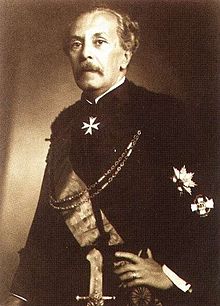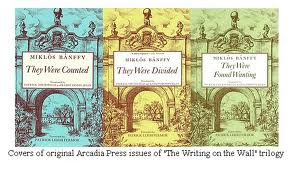Now this is what I call a national literary epic. In this case the country is Austria, and like any NLE worth its salt, the action of the novel takes place over several generations and is bound up with key historical moments in the country's past. The setting is Vienna and the central characters are members of the Alt dynasty, a haute bourgeoisie family who have lived in an imposing home in one of Vienna's better districts since the late 1700s. The Alts made their fortune as piano makers to the stars, as it were; Mozart performed The Magic Flute on an Alt piano. The Alt home at 10 Seillerstatte is really a small apartment building that holds several branches of the family, all of whom are well-connected and respected in Viennese society.
The story begins in 1888 with Franz Alt, heir to the Alt piano company, marrying Henriette Stein, the daughter of a university professor and an opera singer. The other Alts are mildly scandalized by this union. Henriette is half-Jewish and, what might be worse, Franz wants to add a fourth floor to the Alt house to accommodate his new bride. Henriette is not in love with Franz, she's simply marrying because that's what's expected of her. She's actually having an affair (platonic, so far) with Prince Rudolf, heir to the throne of the Austro-Hungarian Empire. On her wedding day Rudolf kills himself and his mistress at Mayerling, the country retreat of the Habsburgs. This symbolic event marks the beginning of the decline and fall of both the Alt family and Austria over the next fifty years.
Henriette's first child is Hans, born in 1890, and it's Hans and his mother who become the main characters in the novel. Henriette is a rebel against the stunted, circumscribed emotional lives of Vienna's upper classes. Her tragedy is that her rebellion finds expression in an adulterous affair that ends in a fatal duel, and, what might be worse, a love for her four children that isn't shared out equally. The children she loves most are Hans and her last child, Martha Monica, the latter being the result of her illicit affair. Hans is also a rebel, although, like his mother, a rather ineffectual one. He doesn't want to join the family firm but can't really find a place for himself in the defeated and ruined Austria that emerges after World War One. Both characters sense and want change, but, like their country, they're trapped in the amber of tradition, social respectability and obedience to authority.
Lothar is a wonderful writer, and it seems odd this book isn't more famous. He's able to switch effortlessly from micro to macro views of Vienna and Austria, the characters are brilliantly realized, the plot is inventive and unpredictable, the era's political changes are smoothly described, and he even manages to incorporate actual characters from history such as Hitler and Freud without any awkwardness. He also created two exceptionally fascinating female characters in Henriette and Selma, Hans' wife; in fact, the pair of them are probably the most interesting and complex characters in the novel. It's also a nice touch that the Alts are in the piano business, since, in symbolic terms, music represents the heart of Austrian culture. The Vienna Melody would also be a great companion piece to The Transylvanian Trilogy by Miklos Banffy, an epic about the Austro-Hungarian Empire set in the decade before World War One.
A word of warning: I read the Europa Editions (picture above) translation of The Vienna Melody, and it was absolutely stuffed with typos. A world record, in fact. Misspelled words, transpositions, words repeated, errant capitalization, it had a little bit of everything. This was either the product of a corrupted Word file or a proofreader suffering a nervous breakdown. It was quite distracting, so if you can find it from another publisher, go for it.
Showing posts with label Miklos Banffy. Show all posts
Showing posts with label Miklos Banffy. Show all posts
Thursday, January 21, 2016
Thursday, March 29, 2012
Book Review: The Transylvanian Trilogy (1934-40) by Miklos Banffy
So, does your country have a national literary epic? Something that captures the entire breadth of a society at a time of crisis over a period of several years or more? War and Peace is the obvious example, but then the Russians sometimes seem to have written nothing but national epics: there's Life and Fate by Vasily Grossman, The Brothers Karamazov by Dostoevsky, And Quiet Flows the Don by Sholokhov, and August 1914 by Solzhenitsyn. French writers took a more scientific, incremental approach, x-raying their nation in novel series such as La Comedie Humaine by Balzac and Les Rougon-Macquart novels by Zola. Dickens and Trollope took the same approach for Britain. But what of the rest of the world? India has The Peacock Throne by Sujit Saraf; Sri Lanka's epic is The Sweet and Simple Kind by Yasmine Gooneratne; The Cairo Trilogy for Egypt by Naguid Mahfouz; Syria`s The Dark Side of Love by Rafik Schami; and Italy`s Il Gattopardo by Lampedusa. An aside: despite it's size, diversity and rich history, the US has never produced a national epic. The U.S.A trilogy by John Dos Passos is an experimental (for the 1930s) attempt at an epic, but it doesn't quite come off. It's probably the size and diversity factor of America that's stopped writers from taking a shot at a single epic novel, but that doesn't explain why no author has tried to go the Balzac route and write a series of novels about the country.
And so my point is that most nations with any kind of strong literary tradtion have produced a national liteary epic or two (come on, USA, you can do it!). One of the best I've read recently is The Transylvanian Trilogy by Count Miklos Banffy, which consists of They Were Counted, They Were Found Wanting, and They Were Divided. The trilogy was produced from 1934-40 and it's the national epic of both Romania and Hungary. Why both? Because Banffy was a proud Romanian with a huge ancestral estate in Transylvania, but he was also a politician in the Austro-Hungarian empire and after WW I he became Hungary's Foreign Minister. In short, Banffy could easily have been in a character in the national epic he wrote.
The central character in the trilogy is Count Balint Abady, and we follow his story through the ten years leading up to the outbreak of WW I. Abady is a voice of reason in the Austro-Hungarian government as the empire dithers and bickers its way into the dustbin of history. But politics is only one facet in this vastly entertaining trilogy. Banffy is a great storyteller, and he stuffs the novels with colourful, vibrant characters. There are frustrated, doomed lovers, dissolute aristos, scheming estate overseerers, gypsies, a barking mad count, and a couple of dozen other memorable characters. Add in duels, hunts, balls and sundry intrigues and you have 1,500 or so pages of addictive reading. Banffy wants to tell the often bitter truth about the world he knew and he wants to do it in the most vivacious way possible.
After WW II, Banffy, like a character in a tragic novel, ended up reduced to a landless nobody with a meaningless title in communist Hungary. He died in 1950 and his novels only became available in English relatively recently. The only drawback to the books are the titles. The individual novels sound like accounting texts, and putting Transylvania in the title of anything leads to thoughts of a very different kind of count. If you have a longish vacation coming up, or if you want to add a check mark to your bucket list of national literary epics, get online with Amazon now.
 |
| Count Miklos Banffy |
And so my point is that most nations with any kind of strong literary tradtion have produced a national liteary epic or two (come on, USA, you can do it!). One of the best I've read recently is The Transylvanian Trilogy by Count Miklos Banffy, which consists of They Were Counted, They Were Found Wanting, and They Were Divided. The trilogy was produced from 1934-40 and it's the national epic of both Romania and Hungary. Why both? Because Banffy was a proud Romanian with a huge ancestral estate in Transylvania, but he was also a politician in the Austro-Hungarian empire and after WW I he became Hungary's Foreign Minister. In short, Banffy could easily have been in a character in the national epic he wrote.
The central character in the trilogy is Count Balint Abady, and we follow his story through the ten years leading up to the outbreak of WW I. Abady is a voice of reason in the Austro-Hungarian government as the empire dithers and bickers its way into the dustbin of history. But politics is only one facet in this vastly entertaining trilogy. Banffy is a great storyteller, and he stuffs the novels with colourful, vibrant characters. There are frustrated, doomed lovers, dissolute aristos, scheming estate overseerers, gypsies, a barking mad count, and a couple of dozen other memorable characters. Add in duels, hunts, balls and sundry intrigues and you have 1,500 or so pages of addictive reading. Banffy wants to tell the often bitter truth about the world he knew and he wants to do it in the most vivacious way possible.
After WW II, Banffy, like a character in a tragic novel, ended up reduced to a landless nobody with a meaningless title in communist Hungary. He died in 1950 and his novels only became available in English relatively recently. The only drawback to the books are the titles. The individual novels sound like accounting texts, and putting Transylvania in the title of anything leads to thoughts of a very different kind of count. If you have a longish vacation coming up, or if you want to add a check mark to your bucket list of national literary epics, get online with Amazon now.
Subscribe to:
Posts (Atom)

